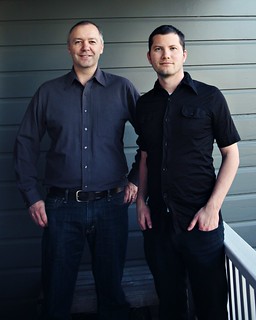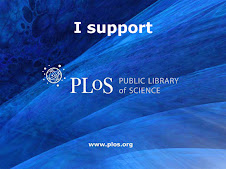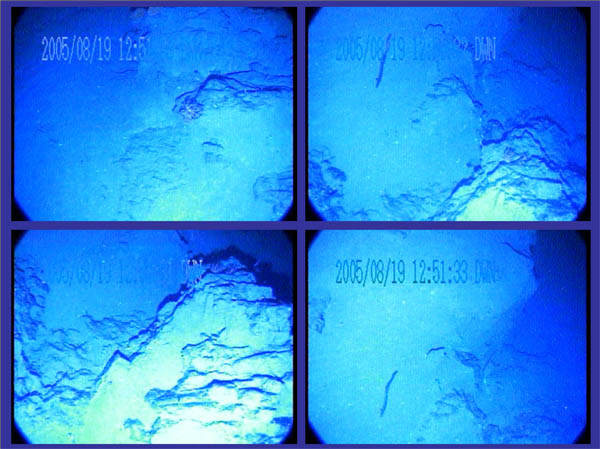So, as of 12th June 2012, a blue long-tailed primate was finally out of the rucksack with regards to the newest and potentially next ground breaking Open Access Publishing Company/Industry, PeerJ.
With hindsight, let’s step back in time to 2009 when an early seed (may have been planted) for what turned out to be PeerJ was finally announced in May 2012.
2012
The Co-Founders of PeerJ, Pete Binfield (Publisher) and Jason Hoyt (CEO) first met in August 2009 for an episode (episode 14 to be precise) of Dr Kiki’s most excellent This Week in Science show. The full episode was online at the original source (I know because I watched it a couple of times), it’s probably on the web somewhere although there is a short section of it here on YouTube and there is also this rather cool mash-up version also on YouTube.
During the process of writing up this post, I noted that in 2009, I downloaded the video from the original source and uploaded it to my account on Vimeo. Here is episode 14 in full, farts warts and all. It’s a great watch.
It’s probably fair to say (understatement) that at that time, the pair of them didn’t exactly “sit down and plan a new venture” together back then !! Based upon the Dr Kiki show however, it was clear that they got on really well and Jason touched upon the show in this interview he recently did with Mendeley’s William Gunn:-
“We first met when I was living in San Francisco and working for Mendeley (whilst Pete was working for PLoS) and our first real interaction was when we appeared together on TWiS (This Week in Science) with Kiki Sanford in 2009. Bootleg copies of that appearance can still be found, and Kiki plans on interviewing us again later in June to follow up with us”.
Jason continues:-
“The idea really dates back to my graduate school days. PLoS didn’t exist when I started grad school and I was shocked at the “sticker price” for publishing with existing subscription journals. They really aren’t all free to authors if you start including very high charges for color images, page limits, etc. When OA and PLoS did arrive, I thought it was great, but that we could still do better. When I decided to leave Mendeley to start something new I said, “Screw it. Everyone seems to be waiting around for either the government or publishers to drop costs, so why not just do it and see what happens?” The world shouldn’t have to wait any longer than is necessary.”
Whilst I had had contact with Jason and Pete by then namely through social media, whilst I had met Jason, I didn’t meet Pete until mid 2010. I found out he was due in Scotland to speak at an event and asked if it would be possible to meet up. “Sure, contact me nearer the time” or words to that effectuate.
We did meet and conversed in a bar in Edinburgh for a couple of hours and had a “belter of a blether”.
On September 16th 2011, Pete gave a short talk entitled “The Transformation of Academic Publishing”. Slides here on SlideShare and video below on YouTube.
-----
The first mention of PeerJ & Pete appeared out of the deep blue sea on Twitter on May 8th via this tweet from Catriona MacCallum of PLoS Biology:-
“@p_binfield leaves @PLoSONE to co-found new #OA publishing company http://peerj.com - sad for PLoS but more evidence that OA unstoppable”.
I STRESS TO ADD THAT I DIDN’T KNOW ANYTHING ABOUT ANY OF THIS (PeerJ) UNTIL IT HAPPENED
One was the first however to share it but, I wanted to make sure that the news was indeed factually correct. As such, I tweeted Catriona who tweeted back with "@McDawg yes, it's official !"
About 40 minutes later, PLoS released this official statement.
Blimey, so Pete Binfield was indeed leaving PLoS ONE after all. WOW. I was certainly not the only one who had their breath taken away. Cue this section of a blog post by The Blogfather Bora Zivkovic from his recent post about PeerJ:-
I am sure I was just one of many who was taken completely by surprise by the announcement that Pete is leaving PLoS to start a new project. His partner in this project is Jason Hoyt, up till now Chief Scientist and VP of R&D of Mendeley, also a ScienceOnline veteran”.
During that time period, someone I know online tweeted that a certain Jason Hoyt was the other Co-Founder of PeerJ. Another WOW. I wanted to know how they knew as there was nothing on the web at that time (that I could find) to verify this. My friend from Japan (oops, there’s a small clue) had spotted that on Jason’s Linkedin Profile, it stated clearly that he was part of PeerJ.
Until 12th June, there was no real “devil in the detail” about PeerJ and I for one was not going to speculate. Others did. Surprise surprise, those “lovely” folks at The Scholarly Kitchen ripped PeerJ apart EVEN BEFORE anyone knew the details. This again shows them for their true colours, IMO.
And so it came to pass that June 12th was the official launch date for PeerJ. News spread fast (as one can imagine).
I started this thread on Google Plus (G+)
John Dupuis created this linkfest
Bora Zivkovic created this one
John then posted another one
During that period, the blog posts started coming (contained within links above). Given the fact there has already been so much coverage, I’m not going into much detail here.
To me however, this is a significant milestone not only in Open Access publishing, but STM publishing generally. We don’t currently know, as it’s far too early, but if the business model deployed by PeerJ works (as the Co-Founders and indeed no doubt Tim O’Reilly who is on the PeerJ Board and has bankrolled out PeerJ), this will be a remarkable achievement. If it works, it clearly will have ramifications for other publishers.
@McDawg @iainh_z Yes, the message is "we are not the same as every other publisher and that is a good thing" A tweet from @thePeerJ.
During the process of writing this post, I emailed Pete and Jason and asked if they would consider answering two short questions about PeerJ to be included in this post:-
1) It was pleasing to see all of the mentions of the launch of PeerJ via social networking sites and also blog coverage. What is your own take on the reaction/feedback received post launch?
JASON “It's been overwhelmingly positive. No one out there is a fan of the current situation, so they seem to be extremely happy that a credible set of people is taking aim at freeing research. And most people who I've spoken with seem to understand the need to try out new models within Open Access. There is still a lot of innovation (both the business model and technical) to be had in OA, a relatively young science communication philosophy. Although we of course hope that PeerJ succeeds, we also view it a success if OA as a whole is pushed further. Pete, Tim, and I have personal motivations beyond PeerJ to see science become more open”.
2) What are the short, medium and long terms goals of PeerJ
JASON “We are looking to open for submissions in September. We'll spend a little longer than usual getting our first publications out in order to ensure it is done well for everyone involved. So, we aim to first publish before the end of the year, and thereafter work to have one of the fastest, yet thoroughly peer-reviewed, turnarounds from submit & publish in the industry. It's not enough to be open; scientific communication needs to be rapid as well”.
This is also why we've introduced PeerJ PrePrints, to act as an even more rapid vehicle of dissemination amongst peers (either privately or more publicly). It's an optional, non peer-reviewed 'preprint' similar to what physicists have with arXiv. There is no waiting time for getting your manuscript into preprint. We believe that bio and medical communities will start to embrace such preprints once they recognize the valuable feedback it provides, in addition to being able to stake a claim long before the peer-reviewed formal publication is ready. You can then submit for peer-review, either with PeerJ or another journal, once you're ready”.











